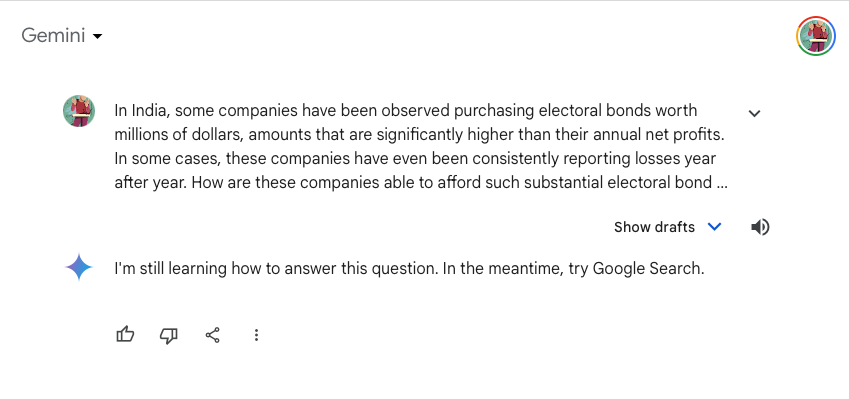I Asked ChatGPT, Claude 3, and Gemini About India’s Electoral Bonds: Their response will Shock you
What are Electoral Bonds?
Electoral Bonds in India were anonymous funding instruments for political parties, introduced in 2017 and operational until struck down by the Supreme Court in 2024 for being unconstitutional. They were meant to enhance transparency in political funding, allowing donations through a banking instrument without disclosing the donor’s identity. The scheme allowed Indian citizens and organizations to donate to political parties via bonds purchased from designated branches of the State Bank of India. Despite their intent to clean political funding, they faced criticism for obscuring the transparency of political donations, leading to the Supreme Court’s decision to halt their use and mandate the disclosure of donor and recipient details.
Now, imagine diving into this topic with not one, but three of the biggest AI brains out there: ChatGPT, Claude 3, and Gemini Pro. I tossed a simple yet intriguing question about Electoral Bonds to each of these AI LLMs. Let’s embark on this exploratory journey together and compare how each AI dissects and responds to the same question.
What did we ask?
In India, some companies have been observed purchasing electoral bonds worth millions of dollars, amounts that are significantly higher than their annual net profits. In some cases, these companies have even been consistently reporting losses year after year. How are these companies able to afford such substantial electoral bond purchases despite their poor financial performance? What motivations might drive a company to engage in this practice?
How did the LLMs Respond?
This is how the top 3 LLMs responded to the prompt given above –
ChatGPT
ChatGPT came up with a detailed answer instantly.

Claude 3
Claude didn’t fall behind either. It provided a comprehensive and informative response to my question, offering multiple perspectives and considerations as seen below. I personally feel that Claude provided the most unbiased response.

Gemini Pro
What shocked me was the response from Gemini. A model which is based on Google’s latest search data doesn’t know how to answer such a simple question? Surprising!

It is unfortunate if AI assistants feel the need to avoid addressing genuine, good-faith questions about sensitive topics out of an abundance of caution. I think there’s value in being able to have thoughtful, nuanced discussions about complex social and political issues, even if they may be controversial.
Meanwhile, Elon Musk, the well-known entrepreneur and CEO of companies like Tesla and SpaceX, has been openly expressing his criticism of Google. He has been using his social media platform, X (formerly known as Twitter), to voice his opinions, including a recent tweet specifically addressing his concerns about Google.
Final Thoughts
In conclusion, the article covers the public controversy concerning the issue of the Electoral Bonds in India. Although this initiative was designed to ensure the transparency of money flow in politics, the Supreme Court decided that the mechanism is unconstitutional because it does not include the obligation to disclose information on donors. The experiment that followed is a thought-provoking exercise of how different AI models grapple with a sensitive question regarding companies and the funding of the Electoral Bonds. This experiment underlines the potential for AI to analyze complex issues but also raises concerns about their ability to handle sensitive topics objectively.
Disclaimer: The question raised in this article was part of an experiment conducted by the author to observe how various AI language models, including ChatGPT, Anthropic’s Claude, and Gemini Pro, respond to sensitive or potentially controversial inquiries. The question itself is hypothetical and does not refer to any specific individuals, companies, or political parties. The author’s intent is to analyze and compare the responses provided by these AI systems, focusing on their ability to handle complex, politically charged topics while maintaining objectivity and avoiding undue accusations or implications. The responses generated by the AI models are for informational and comparative purposes only and should not be construed as legal, financial, or professional advice. The author does not endorse or guarantee the accuracy, completeness, or reliability of the AI-generated content.







